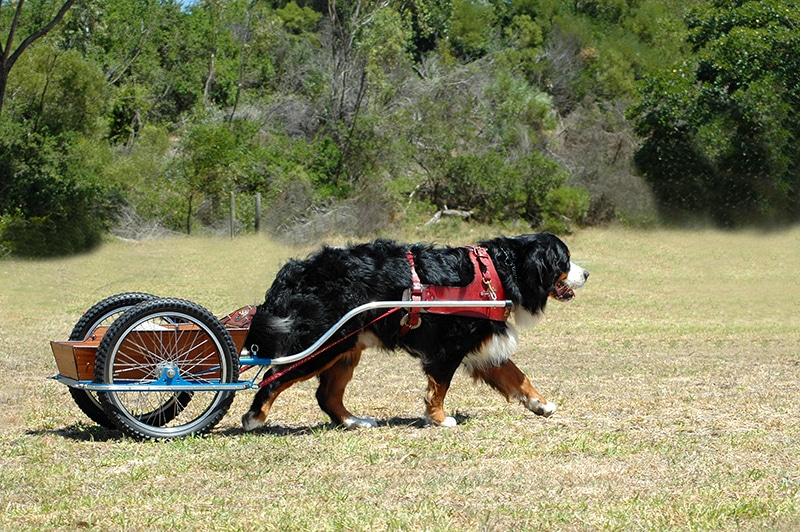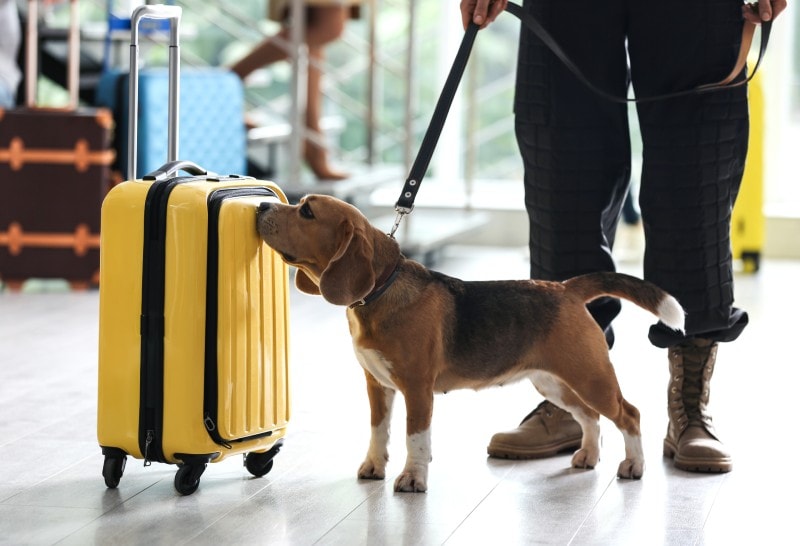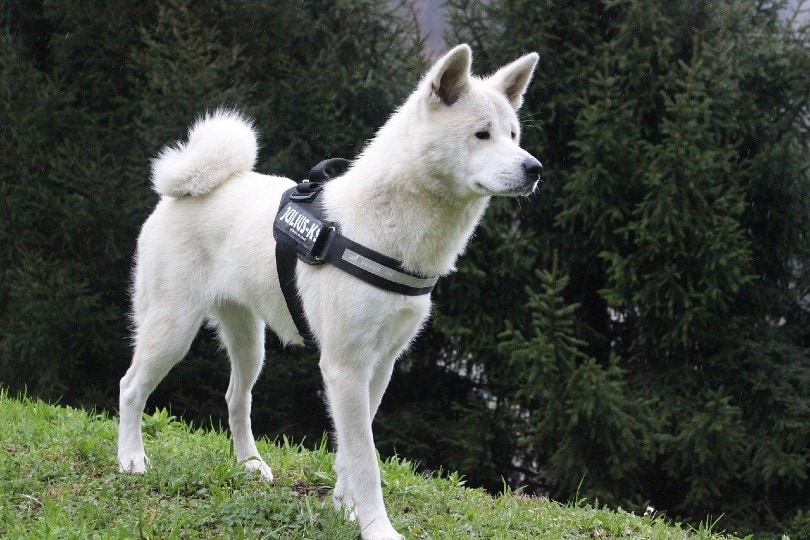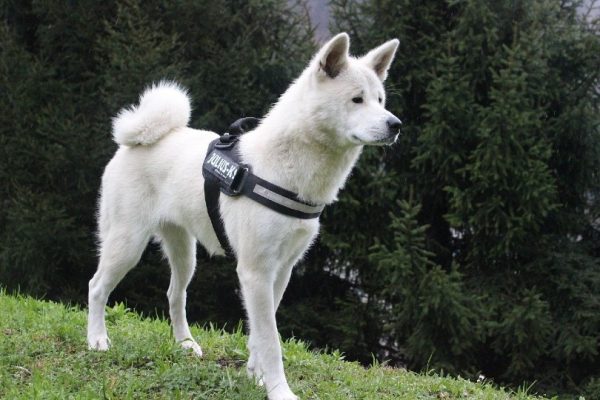Our dogs are capable of amazing things. We all know this to be true. Before it became very commonplace for dogs to be in the home and woven into the fabric of the family, they helped humans with a plethora of essential jobs.
You might be familiar with some of these, but others might catch you by surprise. Here we’re going to discuss 15 jobs dogs have held throughout history so you can see the versatility of their job skills.

The 15 Unusual Dog Jobs Through History
1. Good Transporter in the Gold Rush Days
Dogs really helped their caregivers back in the days of the Yukon. When the gold rush was at its peak, dogs walked alongside men to help them freight wood, transport goods, and deliver mail.
Interestingly, in the town of Dawson and 1898, 4,000 or more dogs were employed regularly by workers, including carriers, miners, and so forth. Within three or four years of this date, the numbers doubled! They were a very valuable asset to people at this time.
Dogs were very resourceful because they could travel over frozen lakes and other water sources, pass through heavy foliage, withstand long distances at any hour, and thrive in harsh conditions.

2. Serum Delivery in Alaska
Heroic dogs were responsible for transporting a crucial antitoxin in January 1925. In the town of Nome, Alaska, an epidemic spread throughout the town with no appropriate medications to contain it.
Human transportation during this time was extremely challenging due to harsh winters. But a brave group of dogs traveled 674 miles from the town of Nenana to Nome in -85-degree temperatures.
They delivered a life-saving serum in a record-breaking 127 hours. Impressively, not a single vial in the entire freight was broken or damaged.
3. Early Space Exploration
In the United States, we used monkeys to launch into space when NASA first started the projects. Instead of monkeys, the Soviet Union used canine companions. On July 22nd 1951, two dogs were launched into space. Their names were Tsygan and Dezik. Though they were cast up, they didn’t actually make it into orbit aboard the R-1 IIIA-1.
As you probably are already well aware, the United States and the Soviet Union were in a space race. They both would taunt the other for the particular animals they chose for their space explorations. But one thing is for certain, man’s best friend definitely paved our way.

4. Livestock Protectors
One of the more common roles you might recognize is the role of a livestock protector. Multiple breeds have held this role throughout time, and it is one of the most important jobs canines have to this day. Livestock was an extremely precious commodity that was guarded heavily by farmers.
But farmers cannot do everything on their own. Dogs helped to ward off bigger predators and keep these animals safe when the farmer could not be present. Dogs have certainly saved many lives of other critters and helped farms thrive.
5. Wine Inspector
Dogs play a major role at wineries! If you have ever been to one and noticed a dog hanging out in the shaded grapevines, they are there for a reason! Not only do dogs keep away pests from stealing all the grapes, they help just as much inside the winery.
Inside, they scour for pests and sniff out potential contaminants. Their sniffers really help to protect the quality of plants, grapes, barrels, and finished products. Chemical compounds can ruin the wine, such as TCA. They taint corks, barrels, and packaging.
Dogs can detect TCA along with other haloanisoles in the air. Since wineries usually have several barrels, this is a highly specialized skill that can save many products for the makers.

6. Bodyguard
Just like humans are employed as bodyguards, dogs can perform just as well—or even better—than their human coworkers. Dogs are built for these sorts of duties. They undergo extensive training and have much faster reflexes and response times than humans.
Often, intruders or perpetrators find dogs much more intimidating than people. Bodyguard dogs are specially trained to protect and defend a particular human—or group of people. They are skilled in detecting threats, escorting people, and physically defending—if necessary.
7. Bomb Detection
Isn’t it amazing to consider that our dogs know where bombs are buried? With proper training, their sniffers can scout out bombs that could be potentially deadly for soldiers and citizens alike.
These dogs are called Accelerant and Explosives Detection Canines. Of course, these pooches have to undergo extensive and time-consuming training. These pups will receive certification and go into the force to help alongside other professionals in the field.

8. Disease Detection
Dogs are so intuitive with our bodies that they can sense disease. It’s true! Dogs can sense illness within our bodies and give us clues about it. You might also know that many dogs are trained for service to assist those with time-sensitive issues like diabetes.
Research of dogs sensing diseases stems all the way back to 1989. Since those abilities have been fostered, we often rely on dogs who can help with such ailments. Surprisingly, dogs can even smell Covid-19.
9. Lifeguard
We all know there are several breeds built to swim. Lifeguard dogs assist humans in patrolling, rescuing, and watching swimmers to make sure all are safe. Typically athletic dog breeds with webbed feet, like Golden Retrievers, Labrador Retrievers, and Newfoundlands, take these roles.
Lifeguard pups start training very early in life, and it carries on consistently until they are between three and four years of age. There are other specific requirements for these roles—so not all dogs are suitable for the job.

10. Mail Deliverer
Now, we all know that dogs are the natural enemy of mailmen. Throughout the times, many mailmen have been chased, barked at, and even bitten by dogs! However, dogs have also helped deliver mail, too. Ironic, right?
Specifically, a dog named Dorsey (a Border Collie) helped Jim Stacy deliver mail. Dorsey would carry letters to miners. Kenny Rogers even gave a shout-out to Dorsey on his album “The Ballad of Calico.” He added a song called “Dorsey, the Mail Carrying Dog.”
11. Search and Rescue
Rescue dogs have held jobs since World War II. They used to search for buried people under debris and rubble from devastating raids. Since then, the concept of rescue dogs has grown exponentially.
Today, search and rescue dogs require very thorough training and certifications before they can go to work. These dogs are quick thinkers who are agile and alert. Often, you’ll see dogs like Belgian Malinois, German Shepherds, and similar breeds perform this job.

12. Firehouse Workers
When you think of a firehouse worker canine, you automatically probably think of a Dalmatian. But you might not understand exactly what made a Dalmatian breed so fitting for the role. Dalmatians have a genetic deafness that encompasses 30% of the total breed number.
This means that a large majority of Dalmatians could not correctly hear or couldn’t hear at all. While this might not be a favorable quality in many aspects of life, that is not the case with a firehouse. Their deafness actually protected them from the loud sirens and commotion.
13. Babysitting
Have you ever heard of nanny dogs? Dogs used to be so terrific with children they were tasked with looking after them. Pitbulls were considered nanny dogs back in the day because of their docile nature and affection for kids.
However, we know now that no dog needs this job. Dogs are dogs with needs and instincts—and it can pose some risks if we dump kiddos off onto them. However, we can certainly enjoy our dogs making great playmates for our children today.

14. Therapy
It is no secret that dogs are good for our souls. They comfort us in our times of need and cheer us up when we’re feeling down. It is obvious that they would be selected for roles in therapy and service.
Not only can dogs be formally trained to uphold such roles, but just their presence can also provide emotional support to those in need. Therapy dogs serve a variety of mental and physical shortcomings, including depression, anxiety, autism, and other issues.
15. Truffle Hunter
A dog hunting mushrooms? You heard that right. Truffles are extremely hard to find, but certain dogs can sniff them out. Some dogs are better for the job—such as Lagotto Romagnolos.
You can find these elusive fungi in the Pacific Northwest. So, this isn’t an option everywhere in the world. But dogs can certainly help out in certain parts of the United States.


Conclusion
Dogs have held some very intriguing roles throughout the course of history. Not only have they helped us by scouting for food, protecting our resources, and pulling their weight on the farm—they have become irreplaceable parts of our families.
Dogs are beneficial for humans in every way—including emotionally. We are lucky to have such creatures in our lives.
Featured Image Credit: haha050haha, Pixabay
Contents
- The 15 Unusual Dog Jobs Through History
- 1. Good Transporter in the Gold Rush Days
- 2. Serum Delivery in Alaska
- 3. Early Space Exploration
- 4. Livestock Protectors
- 5. Wine Inspector
- 6. Bodyguard
- 7. Bomb Detection
- 8. Disease Detection
- 9. Lifeguard
- 10. Mail Deliverer
- 11. Search and Rescue
- 12. Firehouse Workers
- 13. Babysitting
- 14. Therapy
- 15. Truffle Hunter
- Conclusion










